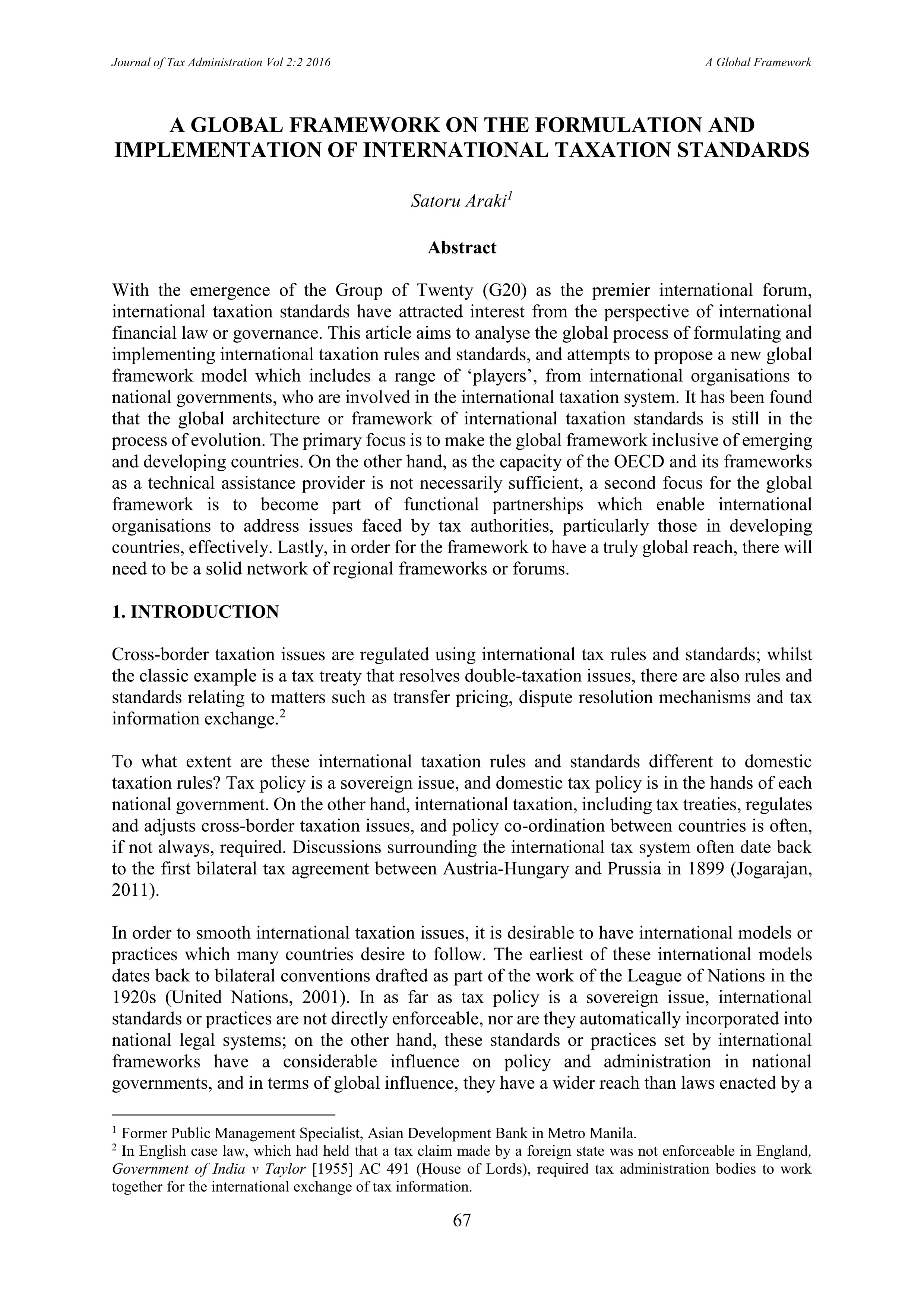A Global Framework on the Formulation and Implementation of International Tax Standards
Abstract
With the emergence of the Group of Twenty (G20) as the premier international forum, international taxation standards have attracted interest from the perspective of international financial law or governance. This article aims to analyse the global process of formulating and implementing international taxation rules and standards, and attempts to propose a new global framework model which includes a range of ‘players’, from international organisations to national governments, who are involved in the international taxation system. It has been found that the global architecture or framework of international taxation standards is still in the process of evolution. The primary focus is to make the global framework inclusive of emerging and developing countries. On the other hand, as the capacity of the OECD and its frameworks as a technical assistance provider is not necessarily sufficient, a second focus for the global framework is to become part of functional partnerships which enable international organisations to address issues faced by tax authorities, particularly those in developing countries, effectively. Lastly, in order for the framework to have a truly global reach, there will need to be a solid network of regional frameworks or forums.
References
Alink, M. & van Kommer, V. (2016). Handbook on Tax Administration (Second Revised Edition). Amsterdam: IBFD.
Araki, S. (2015). Regional Cooperation and Tax Information Exchange among Asia-Pacific Tax Authorities. Asia-Pacific Tax Bulletin, 21. Amsterdam: IBFD.
Asian Development Bank (2014). Technical Assistance Report: Enhancing Transparency and Exchange of Information for Tax Purposes. Metro Manila. Retrieved from http://www.adb.org/sites/default/files/project-document/80788/47149-001-tar.pdf
Ault, H. (2009). Reflections on the Role of the OECD in Developing International Tax Norms. Brooklyn Journal of International Law, 34, 760-761.
Brummer, C. (2015). Soft Law and the Global Financial System: Rule Making in the 21st Century (Second Edition). New York: Cambridge University Press.
Drezner, D. (2007). All Politics Is Global. Princeton: Princeton University Press.
FATF Secretariat. (2014). Financial Action Task Force: Annual Report 2013-2014. Paris: FATF/OECD.
Grinberg, I. (2015). Breaking BEPS: The New International Tax Diplomacy. Available at SSRN: http://papers.ssrn.com/sol3/papers.cfm?abstract_id=2652894
Global Forum on Transparency and Exchange of Information for Tax Purposes. (2009). Tax Co-operation 2009: Towards a Level Playing Field. Paris: OECD.
London Summit – Leaders’ Statement (2009).
Declaration on Strengthening the Financial System – London Summit. (2009).
G20 Leaders Statement: The Pittsburgh Summit. (2009).
G20 Leaders Declaration, G20 Los Cabos Summit. (2012).
G20 Leaders' Communiqué, G20 Antalya Summit (2015).
G7 Ise-Shima Leaders’ Declaration, G7 Ise-Shima Summit. (2016).
Haas, P. (1992). Introduction: Epistemic Communities and International Policy Coordination. International Organization, 46(1), 3.
IMF, OECD, UN & World Bank. (2016). The Platform for Collaboration on Tax: Concept Note.
Jogarajan, S. (2011). Prelude to the International Tax Treaty Network: 1815–1914 Early Tax Treaties and the Conditions for Action. Oxford Journal of Legal Studies, 31(4), 679-707.
OECD, Committee on Fiscal Affairs. (2000). Towards Global Tax Co-operation: Progress in Identifying and Eliminating Harmful Tax Practices. Paris.
OECD, Global Forum on Taxation. (2006). Tax Co-operation: Towards a Level Playing Field. Paris.
OECD. (2009a) Summary of Outcomes of the Meeting of the Global Forum on Transparency and Exchange of Information for Tax Purposes Held in Mexico on 1-2 September 2009.
OECD. (2009b). Decision of the Council Establishing the Global Forum on Transparency and Exchange of Information for Tax Purposes. Paris.
OECD. (2013a). Addressing Base Erosion and Profit Shifting. Paris.
OECD. (2013b). Action Plan on Base Erosion and Profit Shifting. Paris.
OECD. (2014). Two-Part Report to G20 Developing Working Group on the Impact of BEPS in Low Income Countries. Paris.
OECD. (2015a). Explanatory Statement, OECD/G20 Base Erosion and Profit Shifting Project. Paris.
OECD. (2015b). Mandatory Disclosure Rules, Action 12 – 2015 Final Report, OECD/G20 Base Erosion and Profit Shifting Project. Paris.
OECD. (2015c). Tax Administration 2015: Comparative Information on OECD and Other Advanced and Emerging Economies. Paris.
OECD. (2016a). Background Brief: Inclusive Framework for BEPS Implementation. Paris.
OECD. (2016b). Statement from OECD Secretary-General Angel Gurría on the “Panama Papers”. Retrieved from http://www.oecd.org/tax/statement-from-oecd-secretary-general-angel-gurria-on-the-panama-papers.htm
OECD. (2016c). First meeting of the new inclusive framework to tackle Base Erosion and Profit Shifting marks a new era in international tax co-operation. Retrieved from http://www.oecd.org/ctp/first-meeting-of-the-new-inclusive-framework-to-tackle-base-erosion-and-profit-shifting-marks-a-new-era-in-international-tax-co-operation.htm
Porter, T. & Rubio Vega, V. (2011). Global Forum on Transparency and Exchange of Information for Tax Purposes. In T. Hale & D. Held (Eds.), Handbook of Transnational Governance: Institutions and Innovations. Cambridge: Polity Press.
Russo, R. (2016). 3 BEPS Years, a (very) personal perspective. Available on Linkedin.
Sarmiento, D. (2010). The Function of EU Soft Law. In D. Weber (Ed.), Traditional and Alternative Routes to European Tax Integration. Amsterdam: IBFD.
Schrauwen, A. (2010). Sources of EU Law for Integration in Taxation. In D.Weber (Ed.), Traditional and Alternative Routes to European Tax Integration. Amsterdam: IBFD.
Slaughter, A. (2004). A New World Order. Princeton: Princeton University Press.
United Nations, Department of Economic & Social Affairs. (2001). United Nations Model Double Taxation Convention between Developed and Developing Countries. New York.
United Nations, Economic and Social Council. (2004). ECOSOC Resolution 2004/69: Committee of Experts on International Cooperation in Tax Matters.
United Nations, General Assembly. (2015). Resolution adopted by the General Assembly on 27 July 2015: 69/313. Addis Ababa Action Agenda of the Third International Conference on Financing for Development (Addis Ababa Action Agenda). New York.

Downloads
Published
How to Cite
Issue
Section
License
Copyright (c) 2016 Satoru Araki

This work is licensed under a Creative Commons Attribution 4.0 International License.
Our open access status means that authors retain the copyright of their work. However, all papers published in JOTA are done so under a Creative Commons Attribution 4.0 International license (CC BY). This means that others can share and/or adapt your work without your permission as long as they follow certain rules, including attributing your work correctly.
You can learn more about this on our Open Access, Licensing, and Copyright Policies page.



